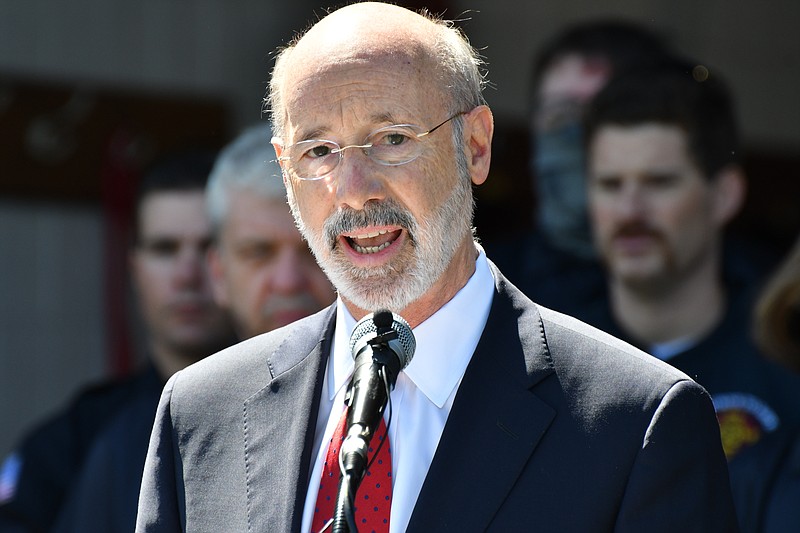POTTSTOWN, Pa. -- Pennsylvania voters became the first in the nation to curb their governor's emergency powers, approving state constitutional amendments proposed by Republican lawmakers over Democratic Gov. Tom Wolf's handling of the coronavirus outbreak.
The vote on Tuesday's statewide primary ballot happened as Republican lawmakers across the country, including Arkansas, have sought to roll back the emergency powers governors wielded during the pandemic.
The constitutional amendments will give lawmakers much more power over disaster declarations, to apply whether the emergency is another pandemic or natural disaster.
Republicans see the referendum as a victory with strong political overtones, as the state gears up for a wide-open governor's race in 2022 with Wolf leaving office after two terms.
[CORONAVIRUS: Click here for our complete coverage » arkansasonline.com/coronavirus]
Republicans in the Legislature and those aiming to replace him in 2023 have made Wolf a top political target, repeatedly attacking his stewardship during the pandemic, including his orders shuttering businesses, sending students home for online schooling and ordering masks worn outside the home.
The state Republican Party chairman, Lawrence Tabas, said in a statement that Pennsylvanians voted to "put a stop to Gov. Tom Wolf's dictatorship."
Wolf has largely lifted his orders to stem the spread of the coronavirus, with the remaining limitations on crowd capacity lifting after May 30 and a mask-wearing mandate for the unvaccinated that tracks federal guidance, until 70% of adults are vaccinated.
Wolf's office maintained that the disaster declaration does not affect orders designed to prevent the virus from spreading.
Rather, it relaxes regulations for medical professionals, gives the state access to federal emergency aid and streamlines National Guard deployments, among other things, his office said.
In statements Wednesday, the Legislature's top Republicans characterized the vote as a victory for individual rights and freedoms, a move to reestablish checks and balances to ensure a functioning, collaborative government.
Wolf said he spoke with legislative leaders of both parties to chart a path forward.
"So we're starting that conversation," he said Wednesday at a news conference in Pottstown. "You can't just flick a switch and make the change. But the voters have spoken, and we're going to do what I think the voters expect us to do and make the best of it."
With votes still being counted Wednesday, support for the two amendments led with 53% of the vote, with 89% of precincts reporting. More than 2.1 million ballots were cast, less than a quarter of the state's 8.7 million registered voters.
The amendments would end a governor's emergency disaster declaration after 21 days and give lawmakers the sole authority to extend it or end it at any time with a simple majority vote.
The state's constitution requires a two-thirds majority vote by lawmakers to end a governor's disaster declaration and, legally, the governor could issue an emergency declaration for up to 90 days and extend it without limit.
The constitutional amendments take effect after the state certifies the election result, possibly in early June.
In Arkansas, lawmakers enacted a GOP-backed measure to curb the governor's emergency powers during this year's legislative session.
Senate Bill 379, now Act 403, by Sen. Kim Hammer, R-Benton, requires lawmakers to review executive orders and makes it easier for them to end a state of emergency.
Republican Gov. Asa Hutchinson's actions in response to the coronavirus pandemic, including a statewide mask mandate, drew frustration from some of the members of his own party.
Hutchinson signed the bill into law after collaborating with its sponsors but was coy about his support. The final version of the bill was described as a compromise.
"If I say I support it, then it might make them want to be tougher, and so I need to be careful as to how enthusiastic I am about it," he told reporters in February.
Republican state legislators filed a lawsuit in September challenging Hutchinson's coronavirus-related mandates, but the plaintiffs ultimately dropped the litigation in April, saying the passage of SB379 made it a moot point and declaring victory.
GOP lawmakers also put forward a bill that would have required the state to return fines levied on businesses for coronavirus-related health violations, but the House failed to override Hutchinson's veto of that bill.
Information for this article was contributed by Marc Levy and Michael Rubinkam of The Associated Press; and by Rachel Herzog of the Arkansas Democrat-Gazette.

